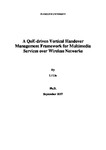A QoE-driven Vertical Handover Management Framework for Multimedia Services over Wireless Networks
| dc.contributor.supervisor | Sun, Lingfen | |
| dc.contributor.author | Liu, Li | |
| dc.contributor.other | School of Engineering, Computing and Mathematics | en_US |
| dc.date.accessioned | 2017-10-10T15:21:09Z | |
| dc.date.issued | 2017 | |
| dc.date.issued | 2017 | |
| dc.identifier | 10368056 | en_US |
| dc.identifier.uri | http://hdl.handle.net/10026.1/10042 | |
| dc.description.abstract |
With advances in wireless technology and mobile devices, the number of mobile users using multimedia services has increased significantly in recent years. Mobile devices can be connected and roam on heterogeneous wireless networks. The IEEE 802.21 group has designed a Media Independent Handover (MIH) standard to ensure seamless Vertical Handover (VHO) in heterogeneous networks. However, the standard currently depends on features of the network (e.g. the type of network and available bandwidth) to achieve seamless VHO. This approach is limited, as it does not consider how a Quality of Experience (QoE) can be provided and maintained for customers when delivering multimedia services in heterogeneous wireless networks. The aim of the project is to develop a novel QoE-driven VHO management framework for providing and maintaining an appropriate level of QoE of multimedia services as the mobile user’s actual requirements in heterogeneous wireless networks. A QoE-driven VHO algorithm is more efficient for maintaining this acceptable QoE of multimedia services than traditional network-based or QoS-based VHO algorithms. There are three main contributions during this project. Firstly, A thorough evaluation of the performance of voice and video services via Skype was carried out in terms of the QoE metric (i.e. MOS). This work identified the impact of video content and packet loss on the QoE metric for voice and video communication services over wireless networks. Secondly, a QoE-driven VHO algorithm was developed to provide and maintain an acceptable QoE of mobile video services for mobile users. Compared to a traditional network-based VHO algorithm, this algorithm can provide better QoE and maintain acceptable QoE. Lastly, the User-centric QoE-driven (UCQoE) VHO framework to provide satisfactory QoE of multimedia services according to the mobile user’s requirements. The framework allows users to set their own preferences (e.g. quality-guarantee or cost-free) and carry out VHO operations accordingly. The evaluation showed that the proposed framework can provide a better QoE for delivered video services than QoS-based and network-based VHO algorithms. Furthermore, the proposed framework can be used to avoid unnecessary cost of mobile data when the option of cost-free is preferred by the user. During this project, three international conference papers had been published and a journal paper has been submitted to IEEE Transactions on Mobile Computing. The main contribution-UCQoE VHO management framework can be developed to maintain QoE of all mobile services in the future. | en_US |
| dc.language.iso | en | |
| dc.publisher | University of Plymouth | |
| dc.rights | Attribution-NonCommercial-NoDerivs 3.0 United States | * |
| dc.rights.uri | http://creativecommons.org/licenses/by-nc-nd/3.0/us/ | * |
| dc.subject | Handover Management | |
| dc.subject | Multimedia Services | |
| dc.subject | Heterogeneous Wireless Network | |
| dc.subject | QoE | en_US |
| dc.subject.classification | PhD | en_US |
| dc.title | A QoE-driven Vertical Handover Management Framework for Multimedia Services over Wireless Networks | en_US |
| dc.type | Thesis | |
| plymouth.version | publishable | en_US |
| dc.identifier.doi | http://dx.doi.org/10.24382/708 | |
| dc.rights.embargodate | 2018-10-10T15:21:09Z | |
| dc.rights.embargoperiod | 12 months | en_US |
| dc.type.qualification | Doctorate | en_US |
| rioxxterms.version | NA | |
| plymouth.orcid.id | 0000-0003-0020-4583 | en_US |
Files in this item
This item appears in the following Collection(s)
-
01 Research Theses Main Collection
Research Theses Main



